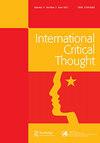Through Pluripolarity to Socialism: A Manifesto
IF 0.4
Q4 POLITICAL SCIENCE
引用次数: 0
Abstract
The ruling class unable to secure working people their existence is “unfit any longer to be the ruling class” and “impose its conditions of existence upon society,” said Karl Marx and Friedrich Engels, urging revolutionaries to smother capitalism in its European cradle, already in 1848. That Springtime of the Peoples was soon followed by the Paris Commune and revolutionary activity worldwide has kept the spectre of communism haunting capitalist classes and advanced the democratisation of social relations in the teeth of determined counter-revolution. In capitalism’s imperial core, working people’s struggles won welfare states and regulated capitalisms after the Second World War, in its peripheries, national independence and developmental states. Meanwhile, some countries, beginning with the Russian Revolution in 1917, embarked on building socialism. Increasingly, they organised production for need, distributed work and its rewards equitably and related to one another in a spirit of cooperation. Despite incomplete successes, great problems and stunning reverses, the struggle they started for a world beyond capitalism, alienation, imperialism and other social injustices continues. Today, after decades of mounting capitalist contradictions, capitalist ruling classes, neoliberal or residually social democratic, in rich countries and poor, are giving Marx and Engels’s words a macabre significance. Over four decades of policies favouring capital, neoliberal financialised capitalism has lost productive dynamism and turned to unproductive plunder, created unacceptable mass poverty, shocking inequality, festering social division, draconian political repression, a growing threat of exterminist nuclear war, mass movements of population and an ecological emergency of climate warming, pollution and biodiversity loss, rendering our planet increasingly uninhabitable. To top all this, today it is responding to a raging pandemic by sacrificing lives to capital and profit and increasing political repression. Rosa Luxemburg famously feared that the alternative to socialism was barbarism. Today, however, it is human and planetary annihilation. By the 2010s, smouldering discontent burst into flames with increasing frequency. The decade began with the Tunisian protests that set off the “Arab Spring” and continued through European protests against austerity. It drew to a close amidst schoolchildren’s protests against climate change, Indian Muslim women’s struggles for citizenship rights, Black Lives Matter, “yellow vests” in France and protests against hopeless economies and political repression, from Turkey to Chile to Nigeria. By 2020, farmers laid siege从多极化走向社会主义:一份宣言
卡尔·马克思(Karl Marx)和弗里德里希·恩格斯(Friedrich Engels)说,不能保障劳动人民生存的统治阶级“不再适合成为统治阶级”,并“将自己的生存条件强加于社会”,他们敦促革命者早在1848年就将资本主义扼杀在欧洲的摇篮里。“人民的春天”之后不久就发生了巴黎公社和世界各地的革命活动,共产主义的幽灵一直萦绕在资产阶级的心中,并在坚决的反革命面前推进了社会关系的民主化。在资本主义的帝国核心,劳动人民的斗争赢得了二战后的福利国家和管制资本主义,在其外围,民族独立和发展国家。与此同时,一些国家从1917年俄国革命开始,开始建设社会主义。他们越来越多地根据需要组织生产,公平地分配工作和报酬,并本着合作精神相互联系。尽管取得了不完全的成功、巨大的问题和惊人的挫折,但他们为超越资本主义、异化、帝国主义和其他社会不公正的世界而开始的斗争仍在继续。今天,在资本主义矛盾持续了几十年之后,无论是富国还是穷国的资本主义统治阶级,无论是新自由主义者还是残余的社会民主主义者,都在赋予马克思和恩格斯的话一种可怕的意义。四十多年来,新自由主义金融化的资本主义政策有利于资本,它失去了生产活力,转向了非生产性掠夺,造成了令人无法接受的大规模贫困、令人震惊的不平等、日益恶化的社会分裂、严厉的政治压迫、日益增长的灭绝主义核战争威胁、大规模人口流动以及气候变暖、污染和生物多样性丧失等生态紧急情况,使我们的星球越来越不适合居住。最重要的是,今天,它正在通过为资本和利润牺牲生命和加强政治镇压来应对一场肆虐的流行病。罗莎·卢森堡(Rosa Luxemburg)担心社会主义的替代品是野蛮。然而,今天是人类和地球的灭绝。到了2010年代,郁积的不满情绪爆发的频率越来越高。这十年始于引发“阿拉伯之春”的突尼斯抗议活动,并延续到欧洲反对紧缩的抗议活动。在学童抗议气候变化、印度穆斯林妇女争取公民权、“黑人的命也重要”(Black Lives Matter)、法国的“黄背心”(yellow背心),以及土耳其、智利、尼日利亚等国抗议无望的经济和政治压迫的活动中,这场运动接近尾声。到2020年,农民开始围攻
本文章由计算机程序翻译,如有差异,请以英文原文为准。
求助全文
约1分钟内获得全文
求助全文

 求助内容:
求助内容: 应助结果提醒方式:
应助结果提醒方式:


